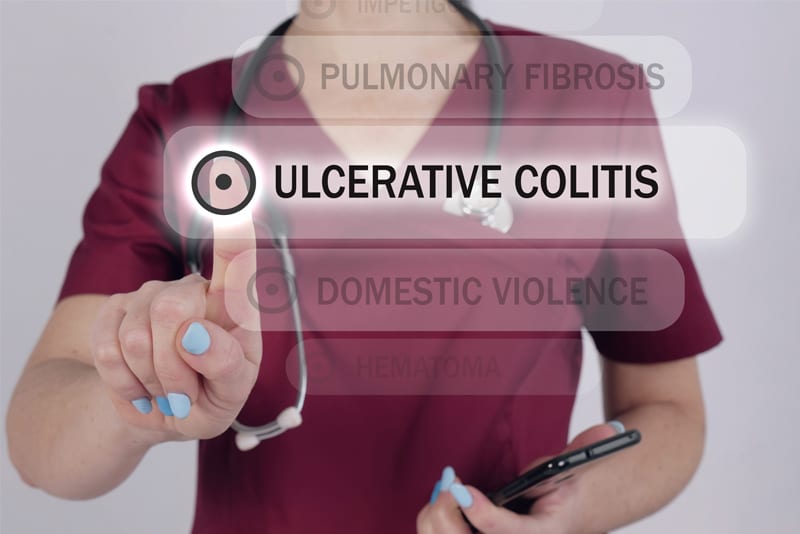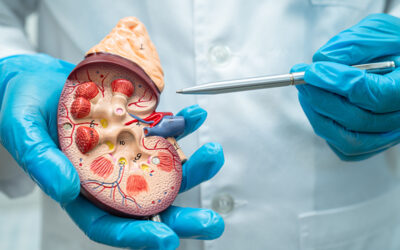Ulcerative colitis refers to a chronic condition of the large intestine, which causes inflammation and ulcers in the lining of the large intestine or colon and rectum. This inflammatory bowel disease (IBD) affects the gastrointestinal tract. Anyone with symptoms of ulcerative colitis should see a medical professional for an evaluation. Gastroenterologists and other specialists treating the condition can consider medical coding outsourcing to submit error-free claims with accurate diagnosis and procedure codes to get on-time reimbursement.
The most common symptoms of this condition are abdominal pain and bloody diarrhea with mucus. Other symptoms include loss of appetite, tiredness, weight loss, anemia, elevated temperature, dehydration or a constant urge to pass stools.
Similar to Crohn’s disease, this disease affects people of all ages, mostly between the ages of 15 and 35. While inflammation causes the bowel to move its contents rapidly and empty frequently, in severe cases ulcers may cause bleeding and discharge of mucus and pus. Long-term inflammation in the large intestine could even lead to colonic dysplasia or colorectal cancer. Factors that increase the risk of getting ulcerative colitis include age, ethnicity or family history. Food and stress can also trigger related symptoms.
Types and Specific Symptoms
Types range from mild to severe. Depending on the affected part of the colon, symptoms may vary and may worsen early in the morning. Based on the area of inflammation, ulcerative colitis is divided into different types –
- Ulcerative Proctitis – In this mildest type, only the end of the colon or the rectum is affected and the symptoms include rectal bleeding, rectal pain or inability to pass stools despite frequent urges.
- Proctosigmoiditis – This type affects the lower end of the colon (rectum and sigmoid colon) and the symptoms include bloody diarrhea, abdominal cramps or pain and a constant urge to pass stool.
- Left-sided Colitis – Here, the rectum and the left side of the sigmoid and descending colon is affected and patients may experience bloody diarrhea, abdominal cramping on the left side, or weight loss.
- Pancolitis – Here the whole colon is affected and the symptoms may include fatigue, considerable weight loss, occasionally severe, bloody diarrhea, or abdominal pain and cramps.
- Fulminant Colitis– This rare, but life-threatening colitis form can affect the whole colon and even lead to a risk of colon rupture and toxic megacolon. The symptoms include severe pain and diarrhea and even dehydration and shock.
This is a long-term condition and if left untreated, symptoms can worsen and the inflammation may spread further, leading to serious complications. Without treatment, it can also increase the risk of physical/mental health issues such as – depression, arthritis, eye inflammation, or even liver and kidney problems.
Diagnosis
Endoscopic procedures such as colonoscopy and flexible sigmoidoscopy are considered mainly to diagnose ulcerative colitis. Other tests and procedures include blood tests and stool studies or imaging tests such as X-rays, CT scan or Computerized tomography (CT) enterography and magnetic resonance (MR) enterography.
ICD-10 Codes to Report Ulcerative Colitis
- K51 Ulcerative colitis
- K51.0 Ulcerative (chronic) pancolitis
- K51.00 …… without complications
- K51.01 Ulcerative (chronic) pancolitis with complications
- K51.011 Ulcerative (chronic) pancolitis with rectal bleeding
- K51.012 Ulcerative (chronic) pancolitis with intestinal obstruction
- K51.013 Ulcerative (chronic) pancolitis with fistula
- K51.014 Ulcerative (chronic) pancolitis with abscess
- K51.018 Ulcerative (chronic) pancolitis with other complication
- K51.019 Ulcerative (chronic) pancolitis with unspecified complications
- K51.0 Ulcerative (chronic) pancolitis
- K51.2 Ulcerative (chronic) proctitis
- K51.20 …… without complications
- K51.21 Ulcerative (chronic) proctitis with complications
- K51.211 Ulcerative (chronic) proctitis with rectal bleeding
- K51.212 Ulcerative (chronic) proctitis with intestinal obstruction
- K51.213 Ulcerative (chronic) proctitis with fistula
- K51.214 Ulcerative (chronic) proctitis with abscess
- K51.218 Ulcerative (chronic) proctitis with other complication
- K51.219 Ulcerative (chronic) proctitis with unspecified complications
- K51.3 Ulcerative (chronic) rectosigmoiditis
- K51.30 …… without complications
- K51.31 Ulcerative (chronic) rectosigmoiditis with complications
- K51.311 Ulcerative (chronic) rectosigmoiditis with rectal bleeding
- K51.312 Ulcerative (chronic) rectosigmoiditis with intestinal obstruction
- K51.313 Ulcerative (chronic) rectosigmoiditis with fistula
- K51.314 Ulcerative (chronic) rectosigmoiditis with abscess
- K51.318 Ulcerative (chronic) rectosigmoiditis with other complication
- K51.319 Ulcerative (chronic) rectosigmoiditis with unspecified complications
- K51.4 Inflammatory polyps of colon
- K51.40 …… without complications
- K51.41 Inflammatory polyps of colon with complications
- K51.411 Inflammatory polyps of colon with rectal bleeding
- K51.412 Inflammatory polyps of colon with intestinal obstruction
- K51.413 Inflammatory polyps of colon with fistula
- K51.414 Inflammatory polyps of colon with abscess
- K51.418 Inflammatory polyps of colon with other complication
- K51.419 Inflammatory polyps of colon with unspecified complications
- K51.5 Left sided colitis
- K51.50 …… without complications
- K51.51 Left sided colitis with complications
- K51.511 Left sided colitis with rectal bleeding
- K51.512 Left sided colitis with intestinal obstruction
- K51.513 Left sided colitis with fistula
- K51.514 Left sided colitis with abscess
- K51.518 Left sided colitis with other complication
- K51.519 Left sided colitis with unspecified complications
- K51.8 Other ulcerative colitis
- K51.80 …… without complications
- K51.81 Other ulcerative colitis with complications
- K51.811 Other ulcerative colitis with rectal bleeding
- K51.812 Other ulcerative colitis with intestinal obstruction
- K51.813 Other ulcerative colitis with fistula
- K51.814 Other ulcerative colitis with abscess
- K51.818 Other ulcerative colitis with other complication
- K51.819 Other ulcerative colitis with unspecified complications
- K51.9 Ulcerative colitis, unspecified
- K51.90 …… without complications
- K51.91 Ulcerative colitis, unspecified, with complications
- K51.911 Ulcerative colitis, unspecified with rectal bleeding
- K51.912 Ulcerative colitis, unspecified with intestinal obstruction
- K51.913 Ulcerative colitis, unspecified with fistula
- K51.914 Ulcerative colitis, unspecified with abscess
- K51.918 Ulcerative colitis, unspecified with other complication
- K51.919 Ulcerative colitis, unspecified with unspecified complications
Appropriate treatment is necessary to help control inflammation. Treatment for ulcerative colitis include medications, diet, or surgery. Medications recommended to relieve symptoms are antidiarrheal medications, aminosalicylates, corticosteroids, immunomodulators, biologics or other dietary supplements. For severe concerns, surgical removal of the colon could be recommended. Certain lifestyle modifications such as drinking more liquids or replacing large meals with smaller, more frequent ones will be recommended to manage the symptoms. HIPAA-compliant gastroenterology medical coding services help medical practices to handle any challenges related to coding for colorectal cancer screenings, colonoscopies or other conditions.




